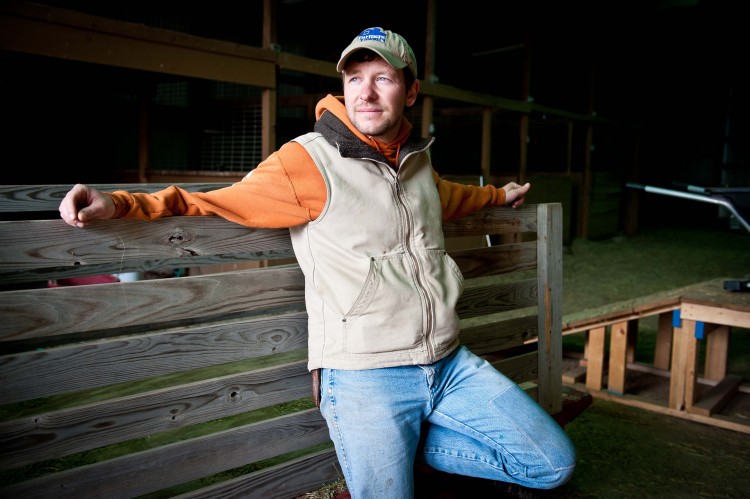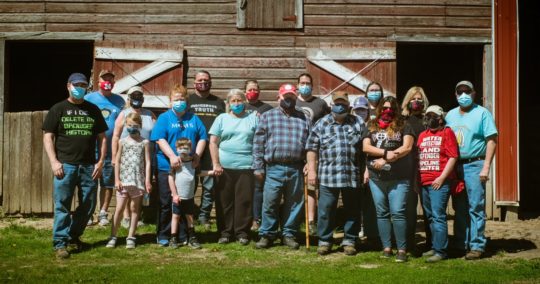

Ben Gotschall is a candidate for Nebraska Public Power District, Subdivision 1
On a brisk spring morning, Ben Gotschall pulled a steel crate wagon loaded with bales of hay to the pasture where his Jerseys were eagerly awaiting breakfast. Halfway up the hill, he turned to me with a wry smile. “I don’t own a tractor,” he said. “I’m a rancher, not a farmer.” Ben raises a small herd of Jerseys for milk and grass-fed beef on a rented acreage in Raymond. He likes to think of the pastureland as an enormous solar panel, where the sun’s energy is collected by the grass. “Then the cattle harvest the grass,” he explained, “and I harvest the products from the cattle—whether it’s meat or milk.”
Click here to give $10 now to support Ben Gotschall for NPPD.
- Ben’s campaign website
- “Like” Ben Gotschall for NPPD on Facebook
- Click here for the full New Energy Voter Guide
Gotschall’s family has been ranching in Nebraska for generations. Ben’s great-grandfather, Ernest, bought 10,000 acres south of Atkinson in 1936 with money he had saved from years of sharecropping outside of Crofton in Knox County. He drove his hundred head of cattle on horseback with the help of neighbors. Since then, the land has been divided and subdivided by the children and grandchildren, but it all remains Gotschall land, including the 1,300-acre section worked by Ben’s parents.
Ben was ten years old when he started milking the family herd of Holsteins. A year later, encouraged by his father, he started his own herd. But instead of raising Holsteins, he chose a heifer calf from his father’s lone brown Jersey. Ben identified with the small but tough calf. He too stood out as one of the smallest kids in his one-room county schoolhouse, but he had big goals. Every year the Nebraska State Dairy Association gives awards for the top herds, and Ben remembers telling his father, “Someday, I’m going to have the best Jersey herd in the state, starting from this one calf.” It took eight years of hard work, but when Ben was a high school senior he won the award for the top producing Jersey herd in Nebraska.
Ben was rightly proud of the award, but the dairy industry was in trouble. The price of milk was below the cost of production. Ben’s father proposed that they develop a herd of organic and grass-fed cattle, because the cost of production was lower, the price of the milk was higher, and customers were seeking the health benefits of drinking milk from grass-fed cows. Ben remembers that his father made three phone calls on the day they made the decision as a family to make the transition: “He called the milk company and said, ‘Don’t pick up our milk anymore.’ He called the feed store and said, ‘Stop bringing feed.’ And he called our neighbors and said, ‘We’ve got milk for sale, and it’s going to be certified organic, and it’s going to be grass‑fed.’” What seemed like a drastic, even radical decision at the time ended up allowing the ranch to continue as a small family operation. Fifteen years later, Ben, his father, and the Gotschall family have a thriving business.
A 75-year family history of ranching and hard work has taught Ben that a sustainable business model is one built on self-reliance, flexibility, and increased agency that seeks diversity in customers and suppliers. Ben’s experience in agriculture gives him a unique perspective when it comes to understanding Nebraska’s energy economy and the public power system. “There’s going to be change,” Ben said. “There are going to be differences through the years in consumer opinion and consumer demands. There are going to be advances in technology. And investments and our policies are going to affect the future.” Ben is concerned that the current NPPD board focuses too heavily on price, while ignoring value. “So‑called cheap energy isn’t really very cheap when we consider hidden costs,” he said, “Imported energy inputs become exported economic benefit, and what we thought in the past was expensive energy is actually much more beneficial and efficient in the long run.”
As we talked about local, renewable energy projects, Ben drew parallels between his work as an anti-Keystone XL pipeline activist and his decision to run for a position on the NPPD board. “We talk a lot about energy independence,” he said, “but renewable energy projects in Nebraska are the key to Nebraska’s energy independence. Local renewable energy projects will create jobs and they will create tax revenue in our state. We should reap those benefits instead of letting a foreign corporation like TransCanada come in and take advantage of our property owners, our land, and our natural resources.”
When I asked Ben how he had come to join the fight against the pipeline, he grew circumspect. “For me, the Sandhills—that place, the people, the ranching way of life—are directly tied to my identity. Oil pipelines are not part of that identity. They’re not part of the identity of that place or its people.”
Ben remembers the moment that he began to fully understand the threat that the pipeline posed to Nebraska. It was 2011, at the State Department hearing in Atkinson when Ben went to the back of the hearing room to review the plat maps of the proposed route laid out on a table. “Just seeing the names of my friends and family and neighbors on the maps and knowing that that place would be forever changed, was just too much. It was just such a violation of common sense to me that I couldn’t turn away from it.” Even though the pipeline route was not on his family’s land, it did cross his neighbor’s land. Ben knew that “if it was in the Sandhills and crossing the aquifer it was in the wrong place, and it still is.”
As an NPPD board member Ben would encourage and invite Nebraskans to invest in their own local energy projects—projects that don’t risk our natural resources and threaten our property rights—whether that’s a single solar panel on a roof or a community‑owned wind farm that has been developed by a cooperative of farmers and ranchers. “That type of local energy investment and local economic development,” he said, “is what will keep our state strong and resilient in the future.”



